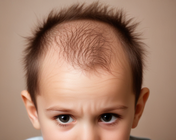Preventing Hair Loss in Kids: What Parents Should Do?
When you look at your child’s head and see a sudden bald spot, it’s shocking. However, hair loss in kids can often be fixed or controlled if parents act quickly and get professional help. But that’s not all. During this time, parents should also learn how to handle their own and their child’s feelings.
How Should Parents Handle Kids Losing Their Hair All of a Sudden?
Parents whose kids are losing their hair should get professional help and read the tips below.
Help with Emotions
When we’re sick, it’s not just the symptoms that worry us. It’s common to feel emotional pain along with physical pain, particularly when our looks or skills change. Kids can be ten times more affected by these mental side effects. This is why parents should learn how to help their kids feel better.
Tips to Keep Young Children from Losing Their Hair
As we’ve already discussed, most cases of hair loss in kids can be avoided or greatly improved by taking these good habits for kids and simple precautions.
 Teach your children not to share their private things with other people from a very young age. You also need to take care of your own cleanliness to avoid infections.
Teach your children not to share their private things with other people from a very young age. You also need to take care of your own cleanliness to avoid infections. - No matter what age, stress can cause hair loss. You should help your child cope with their worry.
- Make sure that your children are getting all the nutrients they need. Not getting enough nutrients can make the situation worse or cause hair loss.
- Do not let your kids wear their hair in tight styles or do anything else that could cause their hair to become too tense.
- If you have any health problems, you should see a doctor as soon as possible. It is important to treat health problems early on to avoid severe symptoms and side effects.
Alternatives to Hair Loss
Some methods for hair loss don’t work right away, and then our hair grows back to how it was before. Some adults may try to undergo NuWays MD hair restoration. For kids, the hair loss process can be challenging for their mental health and make them tired. For instance, they might feel bad at school.
You can tell them about ways to hide their bald spots and have more privacy. This boosts their confidence and makes them feel better about themselves. Here are some ways to fix it.
- Good wigs for kids: You can get a handmade wig or even pieces that match the child’s hair to hide the bald spot. They might even be able to use their hair to make hats.
- Putting on scarves and hats.
- Add some hair decorations, like bows, headbands, bandanas, etc.
- Spray-on hair dyes that cover up bald spots by adding color to the hair.
As a parent, the most important thing right now should be what makes your child feel better.
 Teach your children not to share their private things with other people from a very young age. You also need to take care of your own cleanliness to avoid infections.
Teach your children not to share their private things with other people from a very young age. You also need to take care of your own cleanliness to avoid infections. 

